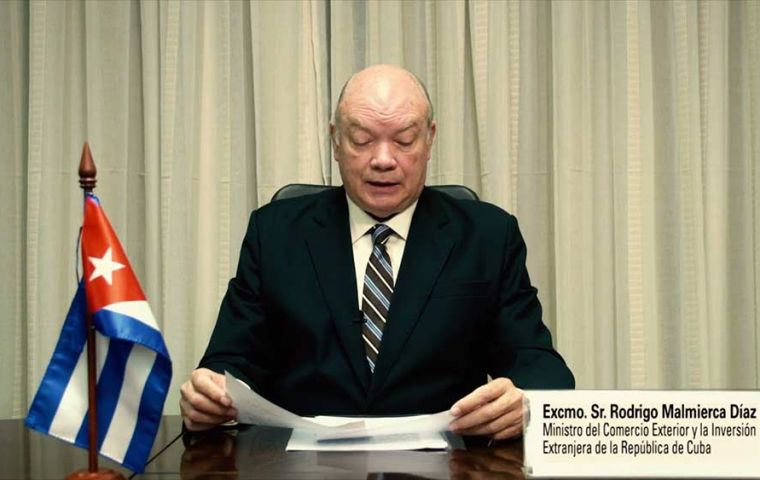MercoPress. South Atlantic News Agency
Cuban official says ok to withhold surplus earnings of foreign company workers
 Objective hindrances create a lot of fear among potential investors, Malmierca said
Objective hindrances create a lot of fear among potential investors, Malmierca said Cuba's Foreign Trade Minister Rodrigo Malmierca has said in an interview with local current news magazine Bohemia last week that he saw a contradiction in workers of global companies earning more than those who did the same job for the local State.
“We have been very careful in trying to avoid those people who work with foreign capital investments, simply for that reason, and perhaps doing the same [work] as another [individual] in a state company, earn much more,” Malmierca explained.
He added that to prevent wages of workers at foreign companies make such a difference, the Cuban government has its own employment agencies with its own policies.
Wages of Cuban workers hired by foreign companies “is something we have tried to preserve through the employment agencies, although foreign investors do not like it. There are also other things that they do not like, and we are not going to change them,” the minister added.
Salaries earned by Cuban workers with foreign employers are way above what people receive when working for the Cuban State. But those foreign investors still consider that official income as merely a part of someone's earnings, which continues to be insufficient amid skyrocketing inflation.
Cuba's employment agency also gets to determine who can or cannot be hired by foreign companies and it prevents workers from receiving their full salary, by withholding the difference between their pay and that of someone else working where Government and employer and one and the same.
The Cuban regime carefully analyzes each investment proposal, which is only approved if it meets national interests. “This is not the case in the rest of the world, but in Cuba that is the guarantee that this foreign investment pays taxes on economic and social development plans, we do not sacrifice sovereignty, the financing has a legal source, and it is not a mortgage for the future,” the minister went on.
Malmierca also claimed foreign investments were not doing as the government would like them to, as a result of the US embargo. He also acknowledged capital transfers had become increasingly difficult. “They activated Title III of the Helms-Burton Act, which allows citizens or companies to sue any company, Cuban or foreign, in the courts of the United States. All of these are real, objective hindrances which create a lot of fear among potential investors.”
He also admitted there were other problems such as Cuba's foreign debt. “If the interested party is guided by the criteria of international risk rating agencies, it is not an attractive country to invest in,” Malmierca conceded. He added “we have other subjective problems, related to shortcomings and internal failures,” such as “the delays in negotiation processes” as well as the “the poor preparation of projects and negotiating groups.” (Source: Cubanet)




Top Comments
Disclaimer & comment rulesCommenting for this story is now closed.
If you have a Facebook account, become a fan and comment on our Facebook Page!